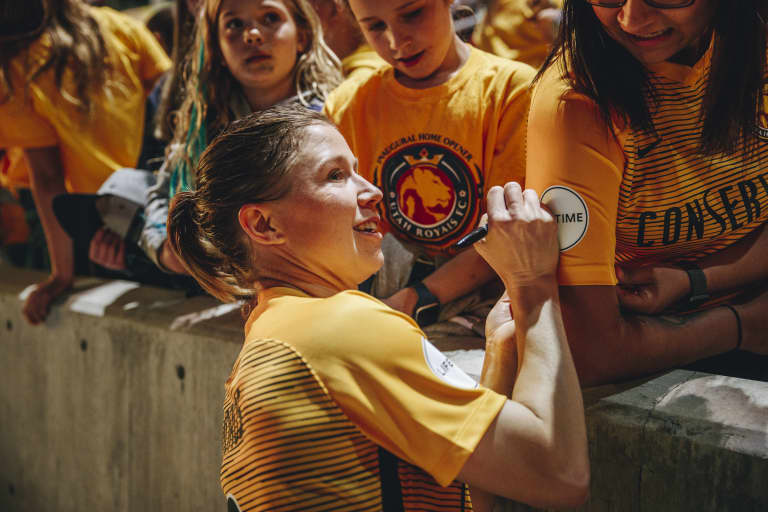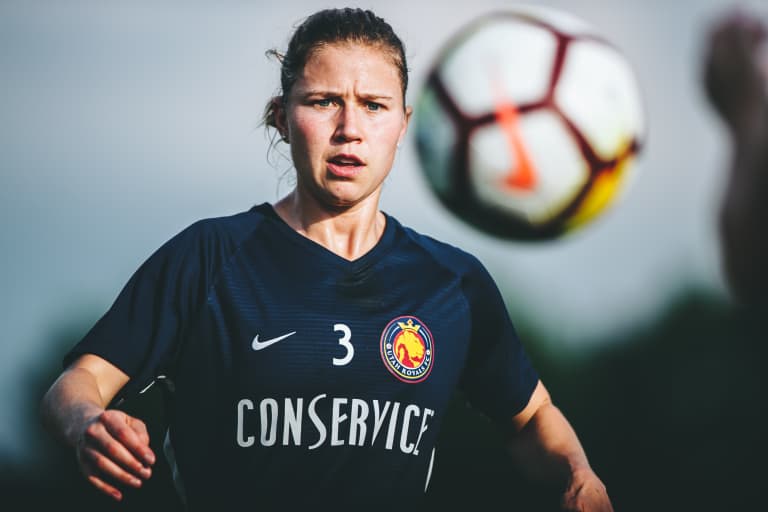When Utah Royals FC played its first match at Rio Tinto Stadium, a strange thing happened to defender Becca Moros. The 12-year veteran was talking with teammates in the locker room when she turned around and saw Head Coach Laura Harvey. She was momentarily shocked, but then took the time to realize that having your coach in the locker room was normal to so many of her male counterparts. It was in that moment that she realized how impactful the magnitude of having a female coach for the first time in her life would be.
Starting this weekend, Moros and 20 other NWSL players will take part in the first offering of the U.S. Soccer C License Course at the Zions Bank Real Academy Training Center in Herriman, Utah. We talked with her about her career path, the decision to take part in the training courses and the opportunities that could come from broadening the coaching pool in women’s soccer.
Why is it important to you to have the opportunity to take this course?
“I think that we underestimate how much messaging affects us – how we live, how we experience things and how we then pass experiences on to other people. That’s why that moment when Laura was in the locker room was such a big shock to me. This is probably normal for the entire male population and it had never crossed my mind that this could possibly be normal. It should be normal, but the structures we have in our minds and the experiences we have growing up really affect how we approach things and what we believe is possible. On the women’s side, the biggest opportunity to be more competitive across the board is for more women to coach. Men who play soccer for 30 years, then plan to coach men. The best of the best male coaches end up on the men’s side coach men until something brings them over to the women’s side. Women are going to come out and coach women or girls. It’s not a knock against anybody. That’s just a fact of the system. If you grow up in an environment, that’s your expectation. Men have that same expectation. For women to coach women, it’s an important thing. Then hopefully women coach boys as well. It’s important for boys and men to understand that women can be coaches too. Those beliefs affect both boys and girls. Then it opens doors for women coaching across the board and it sends a certain message.”

What was it like growing up only playing for men coaches? Did you even conceptualize that coaching could be in your future?
“I had an extremely deep connection to one of my first youth coaches – Winston Buddle, whose son Edson played for the U.S. and played for the Galaxy and is one of the top ten scorers in MLS history. I just attached to him as a little kid. He was both intimidating and inspiring. He was an imposing, fit, tall black man with a thick Jamaican accent. There’s no reason I should have identified with him in terms of any of the superficial things. But his love of the game caught like fire for me. I think that’s just lucky because those aren’t the easiest connections to make. I don’t think all little girls would have been attracted to him as a mentor in the way that I was. I think most wouldn’t because there’s a certain intimidation factor. I think a lot of girls would have a problem working with male instructors in an entirely male class. It’s not set up for you. You have to already have the passion to force your way into that environment. A lot of little girls wouldn’t force their way into an environment that doesn’t appear open to them. For more girls to have environments that are clearly meant for girls to be a part of – and some of that means co-ed classes. There are a lot of creative ways to do it. I have a passionate relationship with soccer because of Winston and I don’t think that would have appealed to all little girl soccer players.”
What was your reaction when you saw Laura in the locker room the first time?
“As soon as they were in the locker room at Rio Tinto Stadium, players were changing and bantering in the locker room. Laura was in the locker room. I turn around and realize she is there. It hadn’t crossed my mind that the words I was saying would be heard by a coach. It was a nothing conversation, but it never occurred to me that a coach would be in there. Immediately my mind was spinning wondering if it was ok. Of course it was ok. There’s no problem with her being in the locker room. I remember the dialogue in my head when I saw the coach was in there. It was fine. I was just shocked that at 33 something that was so obvious would be such a surprise. It had occurred to me, but not the magnitude of it. I’d never been led by a female leader that was making the hard decisions. That was shocking.”

Now to have this course with 20 other NWSL players, what does it mean that the opportunities to work in soccer in ways other than playing for the long-term success of women’s soccer in the country?
“I’ve been playing pro soccer for 12 seasons now and we’ve been trying to get this the entire time I’ve been around. There have been a lot of complexities that have made it take this long. Utah facilitating the course is a huge part of making this a reality for the players. It makes sense that it’s happening now, finally. It’s creating a competitive coaching environment. Every player, especially at this level, can tell you that coaches are critical to the organization of a team and the way a team plays. How people compete not for just one day, but for entire seasons and whole careers. Having better coaches at younger ages means players are having better experiences. They grow up to be either more competitive players or better fans. They have relationships where they don’t walk away from soccer or resenting sports because of something it didn’t do for them or some way it didn’t make them feel. Sport is supposed to make you feel powerful and be a part of something bigger than yourself. There are huge amounts of social opportunities. There is goal-setting and learning how to learn. There are a lot of opportunities for kids and players to affect their own development if they are empowered to do so. It’s a very personal experience for a kid vs. school which is mandatory. It’s something you choose as part of your identity and you continue to reinforce that every year that you choose it. There are huge benefits to kids playing sports. We see way too many drop-off rates when kids hit their teens and it’s probably the time when people need it the most. Life becomes more complicated and exercise becomes more important because it becomes something you have to choose to be a part of. Having better and better coaches that understand development and teaching and facilitating a learning experience that the kid needs to be in control of and that development that they do on their own is going to be more powerful for them than what you force-feed them. Challenging kids but encouraging them to be free and creative and enjoy themselves is very important. That is not a given. None of us have been blessed with all good coaches, but you get a few amazing coaches in your life if you’re lucky and you play long enough and they really impact you. You just have to keep believing in these unbelievable things and that comes from coaching.”
What do you hope most to get out of the courses?
“I think the coolest thing is being in an environment with 20 pro players and three female coaching educators that have been in the game for a long time. To be in that environment that is so specifically inclusive for us – this is where we are supposed to be and it isn’t set up for anybody else – I feel like it’s going to be intense. I know a lot of these players and they know the game. That’s going to be really cool. I think we are going to be in an environment that is going to be a little bit uncomfortable because none of us are used to telling people what to do. We are used to doing. Now we’re in an environment where we have to create lesson plans and tell people what to do. That’s a big shift so I think it’s going to be a huge challenge. There is always a little bit of intimidation when it comes to peer review and being around so many bad-ass women. We’re all super-critical. That’s how we got here. It’s intimidating, but in a good way. Being exposed to something new is always valuable. We live and breathe soccer for so many years so to be exposed to something different, I think it has huge potential for growth. That’s why you keep doing it. As soon as you stop learning, you’re just in a hamster wheel. This will be a good opportunity to get out of that and think a little differently.”




